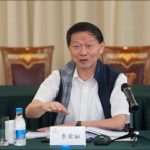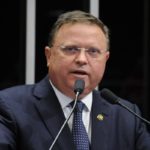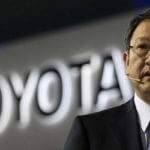Introduction
Hu Jintao justly claims being paramount political leader of more people than anyone else on the planet; 1.3 billion Chinese.
Birth and childhood
A native of Jixi country, Anhui province, Hu was born in Taizhou city, Jiangsu province, in 1942. He finished has primary and secondary school.

Hu Jintao Biography
His later education
In 1959, he was enrolled by Qinghua university and graduated from the hydraulic engineering department in 1965.
A peep into his family life
Hu and his wife Liu Yongqing were schoolmates at Ginghua university. The couple have a son and daughter, who are also graduates of Ginghua university, Enditem.
Read: Carlos Slim Biography
Entrance in politics
Immediately after the 16th party congress, Hu Jintao, along with the members of the secretariat of the CPC central committee, made a study tour of Xibaipo, northern Hebei province. It was from that place that the then CPC central committee left for Beijing on march 23, 1949, to establish state power. A date described by Mao Zedong as the “day to take an exam in Beijing.”
Hu made a speech at Xibaipo, calling on the whole party, leading officials in particular, to review Mao’s important remarks on the eve of the founding of new china.
Hu began to work at the grassroots in west china’s Gansu province in 1968 and stayed there for 14 years. In 1985, he was appointed secretary of the CPC Guizhao province committee and then of the CPC Tibet autonomous regional committee.
The Untring Jintao
During the eight years in Guizhou and Tibet, Hu Jintao faced and won over the adverse conditions and highland anoxia. He visited many remote areas, contacted extensively with people of various nationalities, conducted in-depth investigations and study, and worked out economic and social development strategies and such long-term programs that suited to local conditions. He contributed to stability and development of the two economically less-developed regions. He did so by uniting the members of the leaderships, cadres and people of different nationalities with a view to form a strong joint force for great undertakings. His work experiences in west china’s harsh areas and at the top echelon of the central authorities made him thoroughly understand the national situation, reinforce his conviction in speeding up economic development and reform and opening to the outside world.
Strongholds in politics
In 1992, 49-year-old Hu Jintao was elected a member of the standing committee of the political bureau of the CPC central committee at the first plenum of the 14th CPC central committee. In September 1997, Hu was re-elected member of the standing committee of the political bureau of the CPC central committee at the first plenum of the 15th CPC central committee. In march 1998 and September 1999, he became vice-president of the prc and vice-chairman of the central military commission. Being decade-long member of the standing committee, hu jintao got authority to participate direct in mapping out policies and guidelines of the party and the state. He showed his outstanding ability in handling party, government, military and diplomatic affairs.
Read: Dawood Ibrahim Biography
He made a thorough study of many classics of Marx, Lenin and Mao Zedong to arrive at a profound understanding of Deng Xiaoping theory and the important thought of “three represents, “and lay a solid foundation for his theoretical attainment. From 1993 to the end of 2002, Hu Jintao was concurrently president of the party school of the CPC central committee.
He attended almost all the school’s opening and closing ceremonies and analyzed international and domestic situation. He interpreted the central authorities’ theoretical lines and provided guidance to students. He made painstaking efforts towards the building of the school, the party’s top institution of higher learning, and gave many important instructions. The instructions were related to the school’s educational guidelines, teaching reform, textbook compilation, theoretical research, and the updating of teaching means.
He was a member of the standard committee of the CPC central committee political bureau an took charge of party and personal affairs. He implemented the important thoughts of Jiang Zemin on party building and the building of the contingent of party Cardes. He put forward many propositions on promoting the study of Deng Xiaoping theory and the important thoughts of “three represents.”
thus he enhanced the whole party’s ideological and theoretical level , his aim was to deepen reform of the Carde and personnel system, foster a contingent of qualified Cardes, strengthen the building of the party’s grassroots party organizations, reinforce the cohesiveness and competence of the party organizations at various level, improve the work style of leading groups at all levels, and promote party building in a systematic and standard manner. It was under his guidance that related departments took a series of effective measures and made marked progress in party building.
In the capacity of being first secretary of the central committee of the communist youth league of china (CYLC), chairman of the all- china youth federation, he organized a string of unique, effective and youth- friendly activities that got a strong and positive response from young people and the society as a whole. As a member of the standing committee of the CPC central committee political bureau, Hu was in charge of the affairs relating to trade unions, the CYLE, and the women’s federation. He has achieved success in maintaining a close contact with the people from all walks of life and wining their respect.
In July 1998, it was decided by the CPC central committee to steer the country’s armed force, armed police and law- enforcement authorities out of business activities. Hu was entrusted with the task of implementing the decision which he accomplishes with close cooperation from all the concerned.
Hu’s achievements
Hu has successfully exhibited his wisdom, courage and competence in foreign affairs. He met with many political figures and dignitaries from other countries, and has headed a number of Chinese delegations on foreign tours. His tours to five European nations in 2001 and the united states in 2002 attract wide attention. These tours were dubbed by overseas sources as Hu’s successful “diplomatic debut”. He impressed the local press and people with his easy-going manner and convincing answers braved the rain to extend thanks to overseas Chinese greeting him at the hotel gate with a deep bow.
Humanitarian acts
while at top posts, Hu Jintao has shown great concern for the livelihood of the broad masses. Being the general secretary of the CPC central committee, Hu presided over a meeting of the CPC central committee political bureau to discuss measures to solve the difficulties of masses were facing in their production and livelihood. In early 2003, Hu Jintao went to the inner Mongolia autonomous region to visit needy people while it was a freezing cold of minus 30 degrees Celsius.
There he urged officials at all levels to use the power for the welfare of the people’s immediate interests. And in the end, it can be said that Hu is a man of principles with a strategic vision; he is good at overcoming on the overall situation and making innovations in a pioneering spirit; he is quick-minded and attentive to details in doing things; he believes in solid work and dares to take decisions at critical moments; he is democratic in his style of work. He was a strong charismatic personality; he works selflessly.


